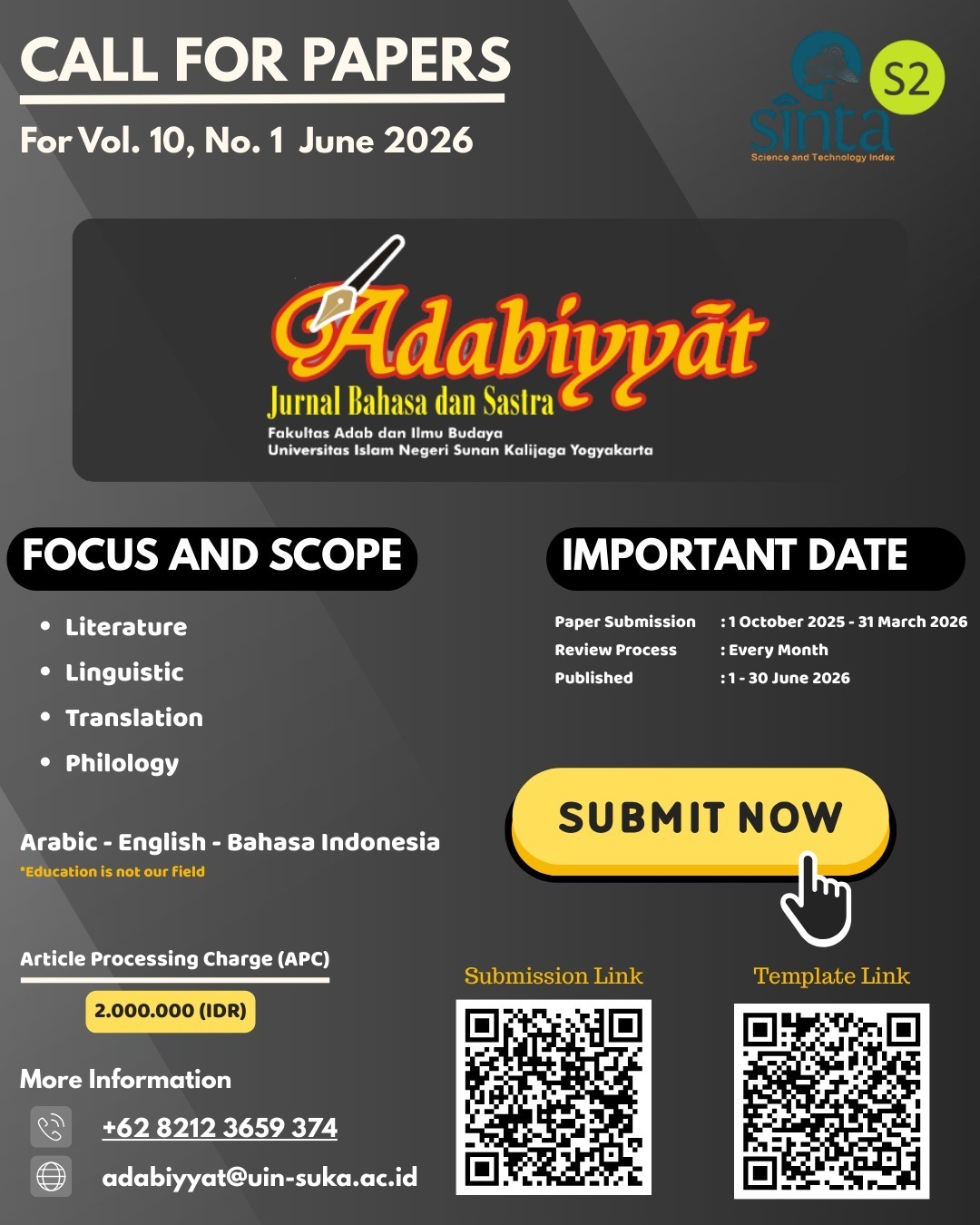KRITIK JUBRAN KHALIL JUBRAN TERHADAP KONSTRUKSI AGAMA DALAM CERPEN “KHALĪL AL-KĀFIR”
DOI:
https://doi.org/10.14421/ajbs.2018.02206Abstract
The material object of this paper is a short story written by Jubran Khalil Jubran, entitled Khalīl al-Kāfir. The formal object is Jubran's criticism of religious construction from the transcendentalist perspective. It aims to answer the question why Jubran criticized religious construction in his writing. As a migrant Arabic writer, who has the experiences of living in the Western and Eastern world, Jubran is able to critically read the construction of religion in the Christian tradition. His criticism is expressed in Khalīl al-Kāfir, which tells his protest and rebellion against the religious leaders as well as the exclusivity and formality of religion which eliminate its spiritual dimension as the soul of human mental enlightenment. The analysis shows that Jubran criticized the sacred authority of priests and monks because of his views that God is immanent and existent everywhere. The immanence of God implies that He is being a power in every human soul. Meanwhile, His existence everywhere emphasizes the over-soul of God's oneness with humans and nature, the oneness of God with all creatures in the universe.
Downloads
References
Bagus, Lorens. 2005. Kamus Filsafat. 4 ed. Jakarta: Gramedia Pustaka Utama.
Bushrui, Suheil B., dan Joe Jenkins. 1998. Kahlil Gibran Man and Poet. Oxford: Oneworld.
Emerson, Ralph Waldo. 2004. Essays and Poems by Ralph Waldo Emerson with an Introduction and Notes by Peter Norberg. New York: Barnes & Noble Classics.
Ghougassian, Joseph P. 1973. Kahlil Gibran: Wings of Thought: The People’s Philosopher. New York: Philosophical Library.
Izutsu, Toshihiko. 1997. God and Man in the Koran: Semantics of the Koranic Weltanschauung. Diterjemahkan oleh Agus Fahri Husein. Yogyakarta: Tiara Wacana Yogya.
Jubran, Jubran Khalil. 2015. “al-Arwāḥ al-Mutamarridah: Khalīl al-Kāfir.” Dalam Al-Mu’allafāt al-‘Arabiyyah al-Kāmilah. Beirut: Naufal-Hachette Antoine.
Majdoubeh, Ahmad Y. 2002. “Gibran’s ‘the Procession’ in the Transcendentalist Context.” Arabica 49 (4): 477–93.
McIntyre, Cathryn. 2006. “Transcendentalism: A Belief in Spirit.” The Thoreau Society Bulletin, no. 255. https://www.jstor.org/stable/23402435.
Minderop, Albertine. 2012. “Kemelut Teologis: Antara Katolikisme, Mistisisme dan Paganisme dalam Bless Me, Ultima.” Adabiyyāt: Jurnal Bahasa dan Sastra 11 (2): 239–78. https://doi.org/10.14421/ajbs.2012.11204.
Pals, Daniel L. 1996. Seven Theories of Religion. New York: Oxford University Press.
Parker, Theodore. 1841. A Discourse on the Transient and Permanent in Christianity. 2 ed. Boston: TP.
Reynolds, Larry J., dan Tibbie E. Lynch. 1979. “Sense and Transcendence in Emerson, Thoreau, and Whitman.” The South Central Bulletin 39 (4): 148–51. https://doi.org/10.2307/3188500.
Robinson, David M. 2003. “Emerson: Religion after Transcendentalism.” The Concord Saunterer 11: 30–37.
Setiawan, Bagus Ramadhani. 2015. “Al Qissah Al Qasirah Khalil Al Kafir Fi Majmu’ah Al Qissah Al Arwah Al Mutamarridah Li Gibran Khalil Gibran (Dirasah Tahliliyyah Haymanah Li Antonio Gramsci).” Skripsi, UIN Sunan Kalijaga. http://digilib.uin-suka.ac.id/15558/.
Tuggy, Dale. 2016. “Trinity > Unitarianism.” Dalam Stanford Encyclopedia of Philosophy, disunting oleh Edward N. Zalta. Standford: Standford University. https://plato.stanford.edu/entries/trinity/unitarianism.html#18t21sCenUni.
Versluis, Arthur. 1993. American Transcendentalism and Asian Religions. Religion in America series. New York: Oxford University Press.
Wayne, Tiffany K. 2006. Encyclopedia of Transcendentalism. New York: Facts on File, Inc.
Wilson, Leslie Perrin. 2000. Cliffsnotes Thoreau, Emerson, and Transcendentalism. Foster City: IDG Books Worldwide, Inc.
Young, Barbara. 1970. This Man from Lebanon: A Study of Kahlil Gibran. New York: Alfred A. Knopf.
Downloads
Published
Issue
Section
License
Copyright (c) 2018 Nurain Rafiq

This work is licensed under a Creative Commons Attribution-ShareAlike 4.0 International License.
- Adabiyyāt: Jurnal Bahasa dan Sastra publishes all articles entirely in full text.
- It is permissible for readers to download and to use it for scientific purposes and scientific dissemination.
- The author can re-publish the article that has been published by the Adabiyyāt: Jurnal Bahasa dan Sastra after obtaining written permission from the editor. This letter can be obtained by submitting a request letter for permission to republish the article to Adabiyyāt: Jurnal Bahasa dan Sastra via email adabiyyat@uin-suka.ac.id. In the second publication, the author is required to include information that the article was firstly published by the Adabiyyāt: Jurnal Bahasa dan Sastra.









